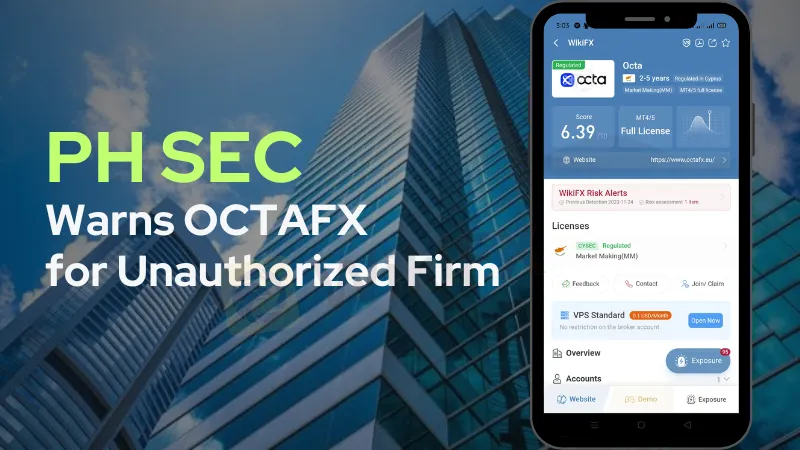简体中文
繁體中文
English
Pусский
日本語
ภาษาไทย
Tiếng Việt
Bahasa Indonesia
Español
हिन्दी
Filippiiniläinen
Français
Deutsch
Português
Türkçe
한국어
العربية
PH SEC Warns Octafx For Unauthorized Firm
Abstract:The Philippines Securities and Exchange Commission (SEC) has recently released a public advisory warning against engaging in investment and trading activities with OCTAFX/OCTA TRADING.

Manila, Philippines - The Philippines Securities and Exchange Commission (SEC) has recently released a public advisory warning against engaging in investment and trading activities with OCTAFX/OCTA TRADING. This firm, found to be operating without necessary licenses, has been actively promoting its services through various social media platforms, targeting Filipino investors.
According to the SEC's statement, OCTAFX/OCTA TRADING is not permitted to sell or offer securities in the Philippines. The Securities Regulation Code (SRC) defines securities as investment instruments such as stocks, bonds, and options that must be registered with and authorized by the SEC before they may be issued to the public. The lack of registration and authorization of OCTAFX/OCTA TRADING raises significant legal and financial risks for potential investors.
OCTAFX/OCTA TRADING's online presence spans across its website, the Google Play store, and the Apple App Store, showcasing over 300 financial instruments from various asset classes such as foreign shares, index funds, commodity derivatives, and foreign currency pairs. The platform also advertises leverage trading with a maximum ratio of 1:500, a feature that can significantly amplify both gains and losses.

Registration and Compliance: A Must for Investor Safety
Under Philippine law, particularly the Securities Regulation Code, there are stringent requirements for companies offering securities. These include:
Registration of Securities: Companies must register their securities with the SEC, providing detailed information like issuance price, use of proceeds, and the nature of the securities.
Issuer Requirements: Securities must be issued by a corporation or a licensed dealer, both of which should be registered in the Philippines.
Secondary License for Public Offering: The issuer must possess a secondary license to sell or offer securities to the public.
According to the SEC's database, OCTAFX/OCTA TRADING does not meet these requirements. The company is not registered as a corporation in the Philippines and operates without the necessary license or authority.
The SEC's advisory underscores the importance of exercising caution before investing in unregistered online investment platforms. Unregistered entities often lack the necessary oversight and investor protection measures, posing a high risk of fraud and financial loss.

Individuals who serve as salesman, brokers, dealers, agents, representatives, promoters, recruiters, influencers, endorsers, or facilitators for unregistered firms such as OCTAFX/OCTA TRADING may face criminal prosecution under Section 28 of the Securities and Exchange serve. According to Section 73 of the SRC, violations may result in severe penalties such as a maximum fine of Five Million Pesos (P 5,000,000.00) and imprisonment for up to twenty-one years, or both.
Further emphasizing its commitment to investor protection, the SEC reiterates its previous advisory titled “Advisory against Dealing with Non-Registered Foreign Entities, Organizations, and Corporations.” This document advises the public to be vigilant and conduct thorough due diligence before engaging with any investment platform, especially those based outside the Philippines.
The SEC encourages the public to verify the registration and license status of any firm offering investment opportunities. This may be accomplished by visiting the SEC's official website or calling their offices directly. Investors are also reminded to thoroughly grasp the nature of their investments, as well as the dangers involved, and to only invest what they can afford to lose.
In Conclusion
The advisory against OCTAFX/OCTA TRADING is a part of the SEC's ongoing efforts to safeguard Filipino investors from fraudulent and unregulated financial schemes. The Commission remains dedicated to promoting a safe and regulated investment environment in the Philippines, ensuring that all entities offering securities comply with the country's legal requirements.

Disclaimer:
The views in this article only represent the author's personal views, and do not constitute investment advice on this platform. This platform does not guarantee the accuracy, completeness and timeliness of the information in the article, and will not be liable for any loss caused by the use of or reliance on the information in the article.
Read more

Top 10 Trading Indicators Every Forex Trader Should Know
Master the top 10 Forex trading indicators to analyze real-time Forex quotes, trends, and market signals. Learn strategies to boost accuracy and avoid mistakes.

Malaysian Influencer Detained in Taiwan Over Alleged Role in Fraud Scheme
Malaysian influencer Hu Chang Mun, widely known as Ady Hu, has been detained in Taiwan for his alleged involvement in a fraudulent operation. The 31-year-old, who was reported missing earlier in December, was located by Taiwanese authorities after suspicions arose regarding his activities.

WikiEXPO Global Expert Interview: Simone Martin—— Exploring Financial Regulation Change
In the midst of financial innovation and regulation, WikiGlobal, the organizer of WikiEXPO, stays abreast of industry trends and conducts a series of insightful and distinctive interviews on pivotal topics. We are delighted to have the privilege of inviting Simone Martin for an in-depth conversation this time.

MultiBank Group Wins Big at Traders Fair Hong Kong 2024
Discover how MultiBank Group, a global leader in financial derivatives, secured three prestigious awards at Traders Fair Hong Kong 2024, highlighting its innovative trading solutions and industry excellence.
WikiFX Broker
Latest News
Volkswagen agrees deal to avoid Germany plant closures
Geopolitical Events: What They Are & Their Impact?
Top 10 Trading Indicators Every Forex Trader Should Know
TradingView Launches Liquidity Analysis Tool DEX Screener
MultiBank Group Wins Big at Traders Fair Hong Kong 2024
WikiEXPO Global Expert Interview: Simone Martin—— Exploring Financial Regulation Change
'Young investors make investment decisions impulsively to keep up with current trends' FCA Reveals
Why Do You Feel Scared During Trade Execution?
CySEC Settles Compliance Case with Fxview Operator Charlgate Ltd
Malaysian Influencer Detained in Taiwan Over Alleged Role in Fraud Scheme
Currency Calculator


